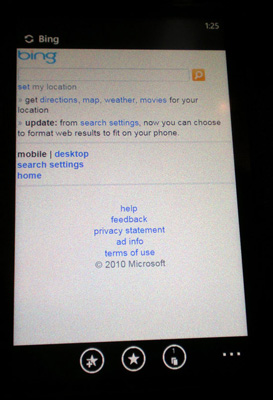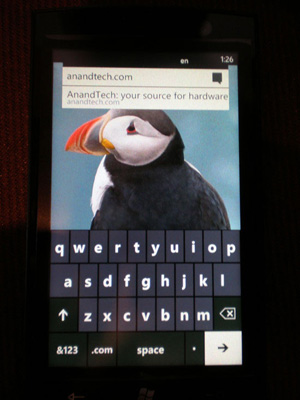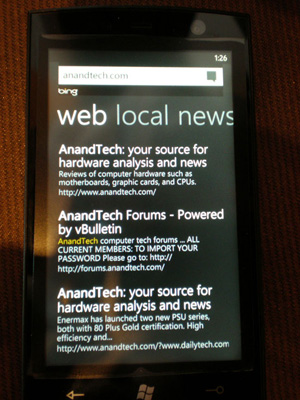Windows Phone 7: The AnandTech Guide
by Brian Klug on March 21, 2010 12:00 AM EST- Posted in
- Smartphones
- Windows Phone 7
- Mobile
No Maps, Just Search
I browsed to Bing.com in the browser, and saw its relatively spartan mobile version:

Even Microsoft acknowledged that their mobile version of Bing needs work.
We moved on to the first-party Bing search application. You'll notice there's no maps tile on the home screen; this is because Microsoft really wants you to use search as your portal for finding everything. I'm told the search context includes everything on your phone, maps, and on the web. I'm told that search will include the scope of local SMS/MMS, and email as well. Microsoft wants you to use Bing search on the phone so much that they've mandated a hardware button dedicated for launching it.
Bing does its best to guess what kind of results are most relevant based on the search. The most common example was the difference between searching something like "sushi," (which should return locations of sushi restaurants first), and something destined for the web, like a website. To try that, I first tried searching AnandTech:

Bing Search Page

Search pivoted to the Web results category first, and returned us at the top of the list.
I then searched "Mexican Restaurant" in the hopes that it would return contextual, location-augmented results first. Search successfully pivoted to local first. Note again that in this video there are a places where images and maps should have appeared, but didn't because of the slow network. I'm also confident that I saw Bing maps on the platform, including the blue circle for our present location. Textures just didn't load in time due to the slow network.
Contextual search at launch will work for a wide variety of subjects including movies, celebrities, flights, and everything else that works through Bing search through the web.
Integration here was everything you'd expect it to be. Search results appear under a variety of categories: Web, Local, and News. Tapping on an entry under local then pivots to the relevant results about the location entity, in this case reviews and information about the location.
What I really noticed here is how easy it was to navigate between three separate applications (maps, Internet Explorer, and Bing search) without being constrained. You'll notice that although this isn't multitasking, we're able to use the back button to transition from, say, the browser seamlessly back to search results. Or from a relevant location entry in the search results, to its location on the map, and back. These are discrete "applications" but manifest themselves seamlessly atop each other.










55 Comments
View All Comments
pcfxer - Sunday, March 21, 2010 - link
Android is far easier to develop for than WM and iPhone. For my engineering project my team is developing a device for non-verbal users.pro5 - Monday, March 22, 2010 - link
Is android Java only? (I don't know) but if so that would reason enough for me not to develop for it. C# and objective C are 'bad enough' but java has always left me cold (I'm a C++ coder mainly).If it can use native C++ then great, still doesn't make up for it's other short comings. The only real advantage I see to Android is how 'open' it is, but really that's more of killer than a helper in the dev community (if money is your goal). How does the GPU compare to Winphone for example? Where is the 'standard' development target (screen size, hardware features). Stuff like iPhone and WP7 are 'easier' to develop for because you never need to 2nd guess the user's hardware config or screen size (ok 2 sizes in the case of WP7 in future)
Penti - Monday, March 22, 2010 - link
Android has the NDK so you can run native code, you don't need to run your code in dalvik. That means C and C++. Just as any other Linux based Phone OS. Such as WebOS. Of course Maemo too. Bada too of course, and of course none Linux based Symbian.The shit runs at the same hardware so what's your problem? Nobody is forcing you to develop for free. That you can release your apps without review is not a bad thing. Apps such as Firefox (Fennec) are ported to Maemo and being ported to Android. There's an Alpha for WinMo too. Something that can't be done on iPhone OS or Blackberry. Or WP7. If you only want to develop for a specific phone thats fine, but then you miss millions of other users. Even if you do android apps you don't need to support every single phone there is. Old phones won't be upgraded to newer versions of Android OS any way. And it's really the software platform that should have the focus any way.
jms102285 - Saturday, April 3, 2010 - link
Hey Anand, I sent you an E-mail regarding what the implications of Microsoft Communications Server just before the release of the WP7 is.... I haven't heard anything back yet in over a week from anyone I mailed about it.Are you guys tight-lipped about it because of NDAs or something???
CSMR - Sunday, March 21, 2010 - link
Not really (http://jkontherun.com/2009/11/23/windows-mobile-vs...">http://jkontherun.com/2009/11/23/window...droid-wi... but hopefully it will be within a year.I'm hoping that it will get full, reliable exchange support (e-mail+calendar+tasks+scheduling meetings+search server etc.).